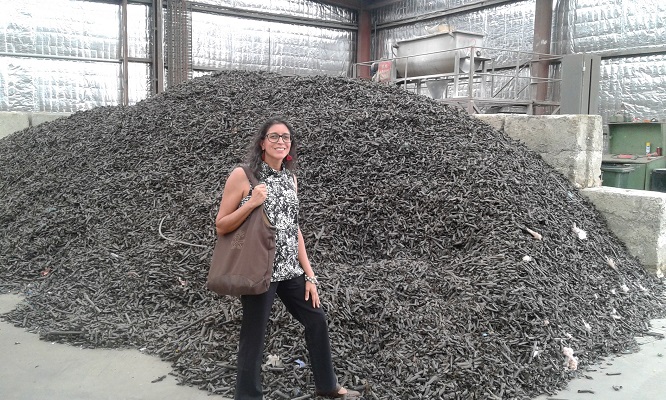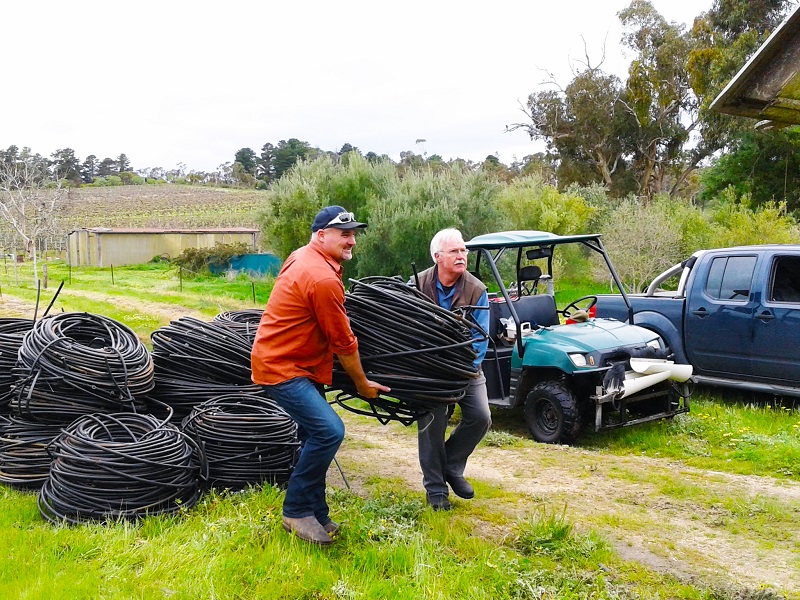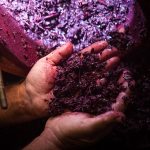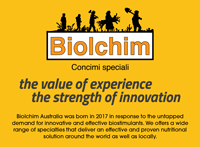A program has been set up in South Australia resulting in an ongoing circular economy recycling service for vineyard operators for their end-of-life drip tube. There is also growing interest in the service from interstate, writes Andrew Spence and Sonya Logan.
A recycling service for end-of-life drip tube discarded by South Australian vignerons is turning this otherwise waste product into new vineyard applications.
The service has been made possible through a Circular Economy Market Development Grant from the SA State Government agency Green Industries SA and is managed by Adelaide-based business Sustaining Endeavour in partnership with Recycling Plastics Australia (RPA), Netafim Australia and Woodshield.
The program has recycled at least 1500km of drip tube this year, yielding 110 tonnes of resin that has been turned into irrigation pipe and plastic-coated vineyard posts. It follows China’s decision in January 2018 to stop importing plastic waste.
As part of the program, Sustaining Endeavour tracks the amount of end-oflife drip tube available for recycling in various regions of South Australia and schedules consignments for recycling with RPA, located in Adelaide’s north. Netafim and Woodshield then purchase the recycled resin from RPA.
Netafim uses the resin to make general purpose low density polyethylene (LDPE) irrigation pipe at its Melbourne factory for use by vineyards, nurseries, landscapers and horticulturalists. Woodshield has used the resin to produce its polyethylene-coated posts for the viticulture, aquaculture, equine and agriculture industries.
With the help of grants and Sustaining Endeavour as project manager, Netafim has also funded the purchase of three re-coiling machines for regional supply partners in McLaren Vale, Barossa Valley and Langhorne Creek.
When a grower goes in to buy irrigation supplies to replace their old drip tube, the supply store offers to loan the recoiling machine to safely recoil their used drip tube. Sustaining Endeavour then helps growers organise transport of their bundles of recoiled drip tube to RPA.
Sustaining Endeavour manager Uma Preston said while plastic recycling programs were common among packaging producers, they were extremely rare when it came to durables.

Photo: Uma Preston
“What we’ve done here is demonstrate what can be done to manage end-of-life plastic — it’s a pragmatic response and it shifts a grower’s focus when they need a recycling solution beyond ‘I need my waste gone’,” she said.
“But it needs commitment from the whole supply chain.
“It’s not just recyclers that you need, you also need manufacturers who are prepared to take the recycled resin and then you want growers to support the recycled (end) products.
“For a long-term sustainable model you need a perfect circular economy where the commitments are matched all the way around the circle.”
Higher volumes of recycled drip tube
Netafim has been recycling its drip tube for several years but the partnership with Sustainable Endeavour, which began in the 2016-17 financial year, has formalised the program and led to higher volumes from more wine regions.
Sustainable Endeavour collected 43 tonnes of drip tube in its first year mainly from McLaren Vale but stopped when the recycler closed its doors.
The sale of the Adelaide-based recycling business and its reopening in December 2018 has allowed the program to start again.
Preston explained that when the recycling service started in 2016, there was enough value in recycled drip tube material for her to pay to have it freighted to Adelaide and return a rebate to growers.
Following China’s decision to stop importing plastic waste, the value in recycled plastic has fallen and she can no longer return rebates.
Growers now need to cover their own freight costs, with Sustaining Endeavour charging $1 per kilometre and a $25 processing fee.
But Preston said many growers were still prepared to support and use the service. Preston said she was now seeking to work with growers, suppliers and transport operators to find an affordable way to bring South Australia’s Riverland into the program.
“In Australia there’s 463,718km of vines and a little over half is in South Australia – 240,395km,” she said.
“About half of this is in the Riverland – 120,000km. There’s a lot of drip tube out there and a certain amount every year is going to reach end of life and my suspicion is that there is certainly enough for me to reach 200 tonnes of resin by the end of this financial year.
“But if there isn’t support for the products that the recycled resin goes in to, you can’t maintain a recycling program or pursue expansion.”
Gauging interstate interest
While the recycling program is only available to SA growers, Preston said growers from interstate had expressed an interest in it and she was in the process of gauging this level of interest and support mechanisms in other states.
Participating wineries that have used the recycling program and purchased products containing the recycled resin from RPA include Henschke, which has used the Netafim LDPE pipe to help establish native seedlings as part of its integrated pest management strategy.
Netafim Australia business development manager Peter Durand said he was not aware of another irrigation company with a similar full cycle recycling program.
“We deal with a lot of corporate wine industry clients and sustainability is something they are taking into consideration more and more when they make purchasing choices.”
However Durand said because the recovered material no longer had a value, Netafim had to absorb some of the cost for transporting the recycled resin to its manufacturing facility in Victoria.
“We are now accepting that it might have to be a bit less profitable in order to do the right thing and I think everyone in the circular economy is a bit the same — everyone at each step needs to give a little.”
RPA’s general manager Stephen Scherer said the recycler had a strategy of working with companies wanting to take responsibility for their products. He said there had been a noticeable shift in the attitudes of younger people on sustainability and environmental issues.
“When Millennials go to the shop they don’t view things purely commercially like previous generations did. Now there is a much more significant environmental conversation going on about how we use our resources and what effort we put into reusing and minimising the loss of those resources.
“It’s those types of activities we want to participate in and anything that’s modelling the circular economy is interesting to me.
“It is a way for us to be sustainable in the long term and if we’re not participating in the responsible use of our own resources, at some point we’ll be held accountable.”
For more information visit www.sustainingendeavour.com.au or contact Uma Preston on 0452 537 266.
This article was first published in the November edition of the Australian & New Zealand Grapegrower and Winemaker.





















